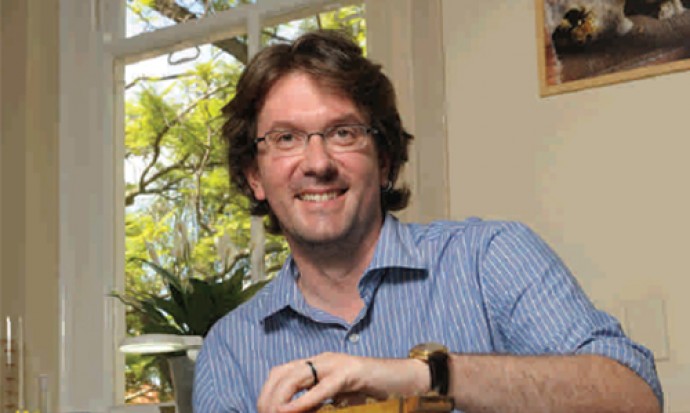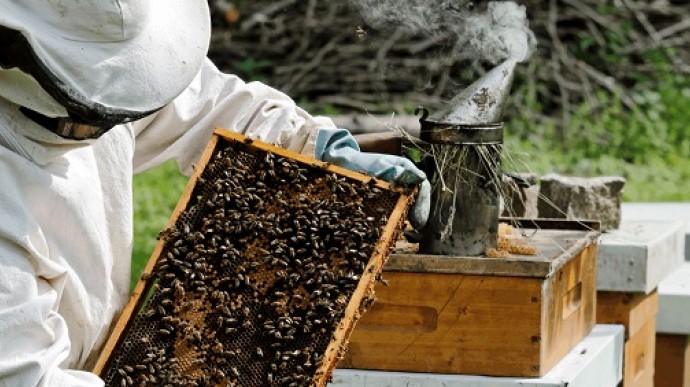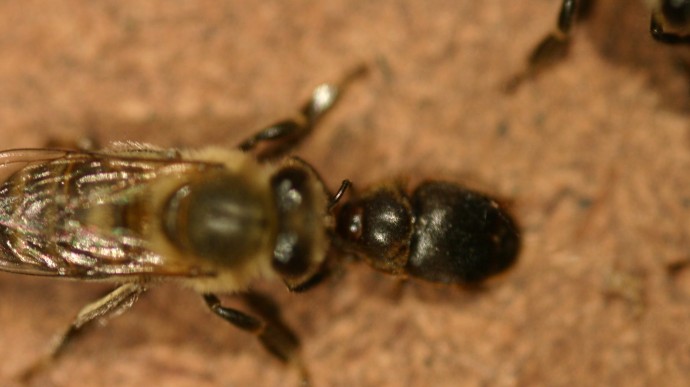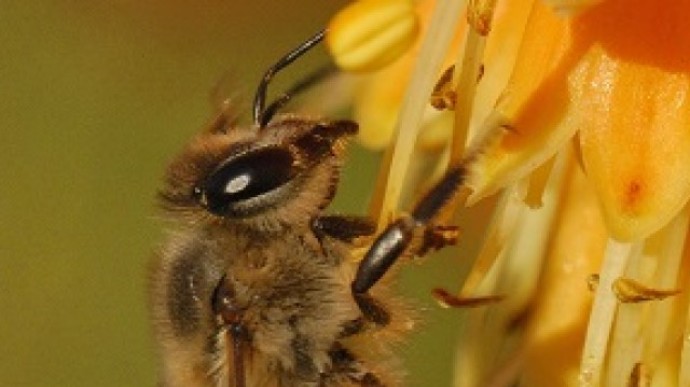Professor Christian Pirk heads the Social Insects Research Group in the Department of Zoology and Entomology at the University of Pretoria (UP). Born in Berlin, Germany, he studied Biology and Mathematics at the Technical University of Berlin before embarking on his PhD studies at Rhodes University in South Africa.
His research focuses on the behavioural and chemical ecology of social insects, in particular honeybees. He is involved in international networks with an interest in pollinator and honeybee health, collaborating with colleagues in Europe, Asia, America and Africa.
Prof Pirk is Vice-President of the Entomological Society of Southern Africa; serves on the management committee of the international COLOSS network, a honeybee research association; and is a council member of the International Society of Chemical Ecology.
He has published over 130 peer-reviewed articles, five book chapters and a monograph on honeybees, and has reviewed for more than 40 peer-reviewed journals and organisations such as the German Research Foundation, the EU-COST Association and South Africa’s National Research Foundation.
Prof Pirk provides an excellent research base for students who are interested in chemical ecology, mathematical modelling, nutrition and social insects, and has supervised more than 40 postgraduates. To date, 19 BSc (Hons), 17 MSc and 13 PhD students have completed their degrees under his supervision. All BSc (Hons) students undertook further postgraduate studies either at UP or another tertiary institution, and have published or will publish their results in international peer-reviewed journals.
Prof Pirk is currently supervising four MSc and 10 PhD students – five of whom are linked to the African Regional Postgraduate Programme in Insect Science at the International Centre of Insect Physiology and Ecology in Kenya – and mentoring two postdoctoral fellows. He serves on the editorial boards of the Journal of Insect Behaviour and Scientific Reports; is editor of Frontier in Insect Science; and is a member of the Academy of Science of South Africa.
1. How did you first become interested in entomology, social insects and bees in particular?
I studied Biology and Mathematics at the Technical University of Berlin for my MSc. The application of game theory in the evolution of social insects perfectly combined both aspects. It led me to social insects. My first visit to South Africa in 2000 put me in touch with the country’s fascinating honeybees. It is fascinating to study insects, to understand how much is needed to make complex decisions and exhibit complex behaviour, like keeping the temperature at 34°C (honeybees) or organise raids on termites (ants). It is interesting to understand how pheromones are used to communicate and affect the behaviour and physiology of the receiver.
2. Share a fascinating fact about the social life of bees that most people don’t know.
Being social is based on being selfish. Working together is their best selfish approach. It’s like our fight against climate change or the pandemic – it can only be done together on a global scale.
3. Which of your many interesting findings concerns you?
Tackling the challenges of ensuring enough pollination service to maintain food security, especially in Africa. Climate change and the large-scale uniformed use of pesticides are the main challenges.
4. In which practical ways does your research help bee farmers and the agricultural sector?
One of our focus areas is the “capensis calamity”, also known as the “capensis clone”. It began when Cape honeybee colonies were brought to the northern parts of South Africa, into the native range of the savannah honeybee. Due to the unique characteristics of the Cape honeybee, it resulted in a clonal lineage of parasitic Cape honeybee workers. These capensis clones, all genetically identical, take over the colonies of any other honeybee subspecies and kill its queen. Since these clones only reproduce and do not work, the host colony slowly dies. The capensis clone is a unique South African problem. Research into it was started by my UP colleague Prof Robin Crew. It helps to address the negative impact the clone has on the agricultural sector. Our work on pesticides and diet is directly addressing burning local and global issues.
5. What lessons can people take from bees in terms of task orientation and social interaction, for instance?
Nothing – because the systems are too different. We tend to “push” biological systems into what we believe they should be. For example, despite our knowledge of them, it took a while to accept the fact that the queen is female and that the only task of males is to transport sperm to the next female. Only in the late 17th century was it slowly established that the “head” of the colony is female. It took even longer to change the idea that there is a king and princes in the colony. I would even say that the term “queen” does not exactly describe the role of the queen. A honeybee colony is the interaction of thousands of female individuals that work together. Some have the task of reproducing, and others have foraging duties. So I would say the lesson is this: work together to solve small and global problems.
6. Do you do transdisciplinary work?
Together with Prof Catherine Sole (Department of Zoology and Entomology, UP) and Dr Ida Breed (Department of Architecture, UP), we research the role of urban environments on pollinators and insect diversity, and how to create areas within the urban space to protect and nurture our pollinators. Along with Prof Pieter de Villiers (Department of Electrical, Electronic and Computer Engineering, UP), I am looking into ways of remotely monitoring the activities and health of individual colonies.
Being part of bigger networks – either within an institution, like being part of FABI [UP’s Forestry and Agricultural Biotechnology Institute], or as part of international networks like COLOSS or SUPERB – facilitates inter- and transdisciplinary work. I am currently part of a consortium working on an application for an EU-COST action on bee research communication.
7. COLOSS is an international honeybee research association. How does such collaboration strengthen your work?
Being actively involved in research means having an international network of collaborators and colleagues. Pollinator decline is a global issue, which is affected by other global questions. Being part of COLOSS allows for easy networking and being part of setting standards like the COLOSS bee book, to which several of the Social Insects Research Group members contributed. We published a recent paper on the effects of COVID-19 on bee research. We also prepared a cost action proposal on communicating bee research to beekeepers. Being a member allows for increased communication and finding like-minded researchers around the world. As an executive committee member, I can put forward an African perspective on global issues related to honeybees.
8. Which part of your research do you enjoy most?
Mentoring the next generation of academics and researchers, and answering questions, especially if one is the first to answer a particular question.
9. What do you do in your spare time?
I read anything, from autobiographies, fantasy and history to scientific books. I take advantage of the excellent weather in Pretoria by swimming.

 Story
Story
 Photo
Photo
 Story
Story
Get Social With Us
Download the UP Mobile App